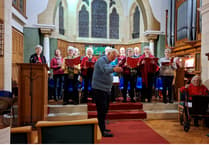At the first Bude area network meeting of the year, held in Kilkhampton’s Grenville Rooms on Monday, January 13 a panel of Cornwall Councillors — Cllr David Parsons, Cllr Peter La Broy and chair, Cllr Nicky Chopak — were joined by representatives from the NHS Trust, Andrew Abbot, Alistair Grand and also Rachel Beadle, who was representing Scott Mann, Conservative MP for North Cornwall.
Alongside the panel of representatives, were various members of neighbouring parish and town councils in the network area, as well as concerned members of the public.
Cllr Chopak opened the evening and explained that usually the network meetings are in essence, ‘not very controversial’ but recognised that this evening was an exception, ‘clearly’.
Cllr Parsons described what had happened. He said: “We were on a really good track with what we were doing at the Overnight Treatment Centre in Stratton. We had two positive meetings and were looking to enhance the service.
“I was given the information on the third of January that it was closed. There had been no consultation in this process and this is exactly what happened last year.
“Come Wednesday morning it was clear that the hospital wouldn’t be opening overnight anytime soon. I have no confidence that it will open in the future.
“Our patients get reduced care across the boarder, which will hit both sides. There will be a risk to a lot more of our patients. The effect of closing this service has on a rural community, we want it reinstated with a guarantee it wont happen again and we want to enhance this service — we won’t ever get an A & E in Bude but we can get a better service.”
Alistair Grant, medical director for Cornwall Hospital Trust, responded to the comments made by Cllr Parsons. He said: “I am not a commissioner, so I am just speaking for a point of view of the hospital, and because I have been part of the ‘gold meetings’.
“This winter we have had more sick patients than normal, Norovirus and flu that has affected staff and patients.”
He went onto explain that at Treliske, they had been put onto ‘black alert’ and were almost on the verge of having to declare a major incident on January 1, due to the amount of people needing to use the service.
It was also explained that when these incidents happen, all partners across Cornwall meet three times a day, including representatives from the Foundation, various clinicians, the 101 service and the South West Ambulance Service.
Alistair added: “I wasn’t in the meeting where the final decision was made about Stratton Hospital.”
Andrew Abbott, director of primary care at the Kernow Clinical Commissioning Group, began by offering an apology to Cllr Parsons, stating that the communication had been inadequate.
He said: “It was pretty awful, I am sorry the message didn’t get sent. Sometimes the pressures are so high the message didn’t get out and we got that very, very wrong.”
He went on to describe his annoyance after the service had to be pulled from Stratton. He added: “I couldn’t be more frustrated at the time of this, at the risk of taking the wind out of the sails for a really good idea.
“We have been looking to build this model elsewhere in other areas, as it has been a really good idea and this hasn’t happened this time and we want to apologise for getting it wrong.”
Cllr Parsons made the point that the users of the overnight service in Stratton wouldn’t use the Cornwall based hospital. He said: “The effect here doesn’t have an impact in Treliske, it has an impact in North Cornwall and the numbers they receive.
“Also, I’m sure everyone would’ve understood this decision in an emergency, a few days or a week maybe, but two months is a long-term problem.”
Cllr Parsons was keen to hear the views from Holsworthy Rural Division Devon County Councillor, Barry Parsons, who has been working alongside Cllr David Parsons. He was keen to emphasise the cross-border collaboration, between both Bude and Holsworthy.
“David and myself have done a fair bit of work between us, when the hospital beds in Holsworthy were closed and we had to work to get that re-opened, I am grateful to how Cornwall and Devon were working together and it seems to be working well.
“There has to be that community involvement, from day one, or else you’re asking for problems. No one life is more important than another life. In situations like this, it becomes a numbers game. If you look in towns and cities, you will get a better service, that is why a lot of younger people move away to those areas. Rural people deserve the same service as everyone else and that’s as equally as important.”
Many times both Alistair and Andrew were asked what was the reasoning behind the decision, which was picked up by Alistair, as he had been present during the ‘golden meetings’ — where the clinician managers make the key operating decisions.
Bude-Stratton town councillor, Robert Uhlig expressed how he thought this didn’t make any sense. He said: “There is a fundamental flaw in the decision making process, you look at St Austell and the impact is being had at Treliske.
“Our impact is on Barnstaple, you’re moving the clinician at Stratton to St Austell and we don’t send anyone there, therefore it’s flawed.”
One member of the public was shocked that neither Andrew or Alistair had the information as to why the decision was made. In response, Alistair quoted the number of service users recorded at Stratton. He said: “The footfall here in Bude is equal to 1.6 per evening which is less than in St Austell.”
However, this was quickly interrupted by Cllr David Parsons, who interjected: “I’m going to interrupt you there, that was the figure when it was a MIU, now it is at least two.”
But according to Alistair, these were the only figures he had been given.
Another member of the public wanted to know if the other surrounding hospitals were involved in the decision making. He said: “Is this purely a Cornwall centric decision, what about North Devon and Exeter?”
Alistair explained that over the Christmas and new year period everywhere was overrun, but ultimately there were no representatives from Barnstaple or Exeter hospitals.
Cllr Chopak wanted to know if this situation would be repeated in the future. She posed: “When we reopen Stratton and in three months’ time Treliske goes into black alert, you might think we’ve done it before let’s do it again.”
Alistair wanted to reassure the public and the panel that there is work being done to avoid this from happening again. He said: “The reassurance I can give you is looking at our critical plan, and look at our position, that would not involve closing Stratton and look at things involving west Cornwall, there is a whole list of various actions we are planning to try and avoid letting this happen again.”
Reg Hambley, chair of Kilkhampton Parish Council, emphasised how his village needed Stratton. He explained: “We have plans here in Kilkhampton for over 100 homes to go up, Stratton is essential for us.”
Chair of Launcells Parish Council, Dr Alan Whittle, asked why it was removed for two months.
It was explained by Alistair, when looking at recorded data, February is a difficult month with ‘very specific problems’ — mainly the availability of doctors.
When asked if this was the right decision to make and if they would make it again, Andrew replied: “I think it was a badly communicated decision, but I will always stand by the decision made at the time.
“If I was to stand in a room and have a load of clinicians saying we need to divert a finite resource to one area, I would agree.”
Rachel Beadle suggested marking a boundary to resolve the issue. “Nobody in Bude uses Treliske, could there be a boundary where Stratton gets removed from the ‘grabbing of the service’, as I know we’re talking about Cornwall here but we need to talk about both counties,” she said.
Andrew said: “I think we need to look at how we can make the best of things here, I don’t think we can draw a line, but I take your point.”
He went on to say: “A number of priorities have emerged. I think we can create an event where we can get together and have a really in-depth conversation. A real focus on inequality and looking at people’s wellbeing as opposed to looking at how to treat people — being proactive, not reactive.
“Understanding the population of the area, a primary care network that can work together. Rather than say ‘what’s the matter with you, but what matters to you’. What opportunities are there to do this?”
Cllr Parsons replied: “I think it would be really good to not just do it with the parishes in Cornwall but involve those in Devon.”
Cllr Barry Parsons agreed.
It was finalised that an informal meeting would be held in Morwenstow, to talk about how the services can move forward benefiting and involving both Cornwall and Devon. This will be held on Tuesday, February 4 at 10am.





Comments
This article has no comments yet. Be the first to leave a comment.